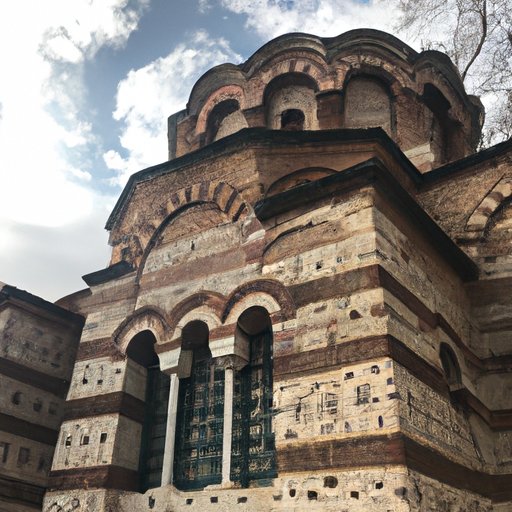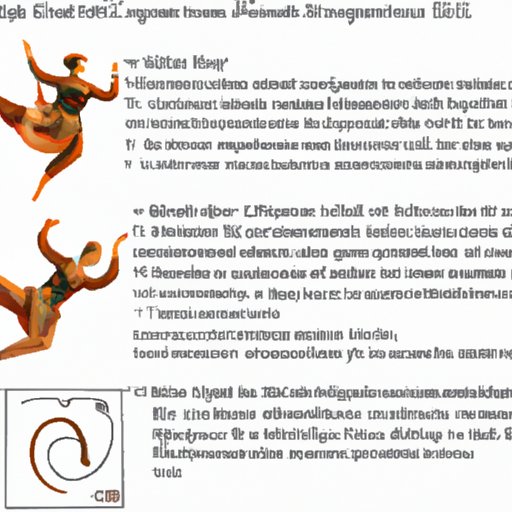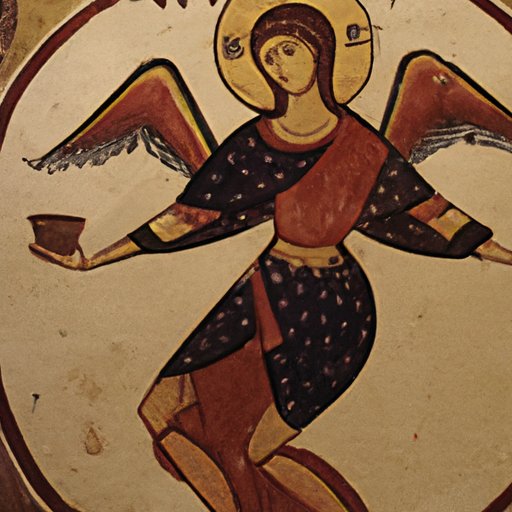Introduction
The Byzantine Empire was one of the most influential civilizations in world history. The Empire was a major force in the Mediterranean region for more than a thousand years, and its legacy has been felt in Europe ever since. This article will explore how Byzantine culture influenced Europe in terms of politics, religion, art, literature, science, technology, music, and dance.
Examining the Political and Social Structures of Byzantine Empire
The Byzantine Empire was ruled by an emperor who held absolute power. The emperor was surrounded by a court of advisors and was responsible for setting laws and policies that governed the empire. He also had the authority to appoint government officials and to declare war or make peace with other nations. The government of the Byzantine Empire was highly centralized and hierarchical, with the emperor at the top of the chain of command.
Religion played an important role in Byzantine society. Eastern Orthodoxy was the official religion of the empire, and it was closely tied to the political system. The emperor was seen as the head of the church, and he had the power to appoint bishops and other religious officials. Monasteries were also important centers of learning and worship, and many of their practices and rituals remain in use today.

Exploring the Legacy of Byzantine Art and Architecture
Byzantine art and architecture are some of the most recognizable and influential styles in the world. Iconography and mosaics were used to decorate churches and cathedrals, and these works of art often featured religious themes. Churches and cathedrals built during the Byzantine period were usually ornate and grand, reflecting the wealth and power of the empire. The influence of Byzantine art can be seen in the artwork of many European countries, including Italy and Russia.
Analyzing the Role of Religion in Byzantine Culture
Religion was a major part of life in the Byzantine Empire. Eastern Orthodoxy was the official religion, and the emperor was seen as the leader of the church. Monasticism was also an important part of Byzantine culture, and monasteries were important centers of learning and worship. The spread of Eastern Orthodoxy to other parts of Europe was a major factor in the growth of Christianity in the region.
Investigating the Impact of Byzantine Literature on European Thought
Byzantine literature had a profound impact on European thought. Many ancient Greek texts were preserved in the Byzantine Empire, and these works were later translated into Latin and distributed throughout Europe. Byzantine poetry and prose also had a significant influence on European writers, particularly in the Middle Ages. Ideas such as courtly love and chivalry were popularized by Byzantine authors and spread to other parts of Europe.

Assessing the Influence of Byzantine Science and Technology on Europe
Byzantine science and technology had a major impact on Europe. Advances in medicine, mathematics, astronomy, engineering, and military technology were made during the Byzantine period. These discoveries were later adopted by other countries in Europe, allowing them to make further advances in these fields.

Evaluating the Contributions of Byzantine Music and Dance to European Art Forms
Byzantine music and dance had a lasting influence on European art forms. Byzantine music was often used in religious ceremonies and rituals, and it was characterized by its use of scales and modes. Byzantine musical instruments, such as the lute and oud, were also adopted by other countries in Europe. Byzantine dance was also popularized in Europe, and it is still practiced in some areas today.
Conclusion
The culture of the Byzantine Empire had a lasting impact on Europe in terms of politics, religion, art, literature, science, technology, music, and dance. The political and social structures of the empire set the stage for the development of modern European governments. The legacy of Byzantine art and architecture can still be seen in many parts of Europe. Religion played a major role in Byzantine culture, and the spread of Eastern Orthodoxy to other parts of Europe was a major factor in the growth of Christianity in the region. Byzantine literature had a profound influence on European thought, and advances in science and technology made during the Byzantine period allowed Europe to make further progress in these fields. Finally, Byzantine music and dance were adopted by other countries in Europe, and they remain popular to this day.
(Note: Is this article not meeting your expectations? Do you have knowledge or insights to share? Unlock new opportunities and expand your reach by joining our authors team. Click Registration to join us and share your expertise with our readers.)
